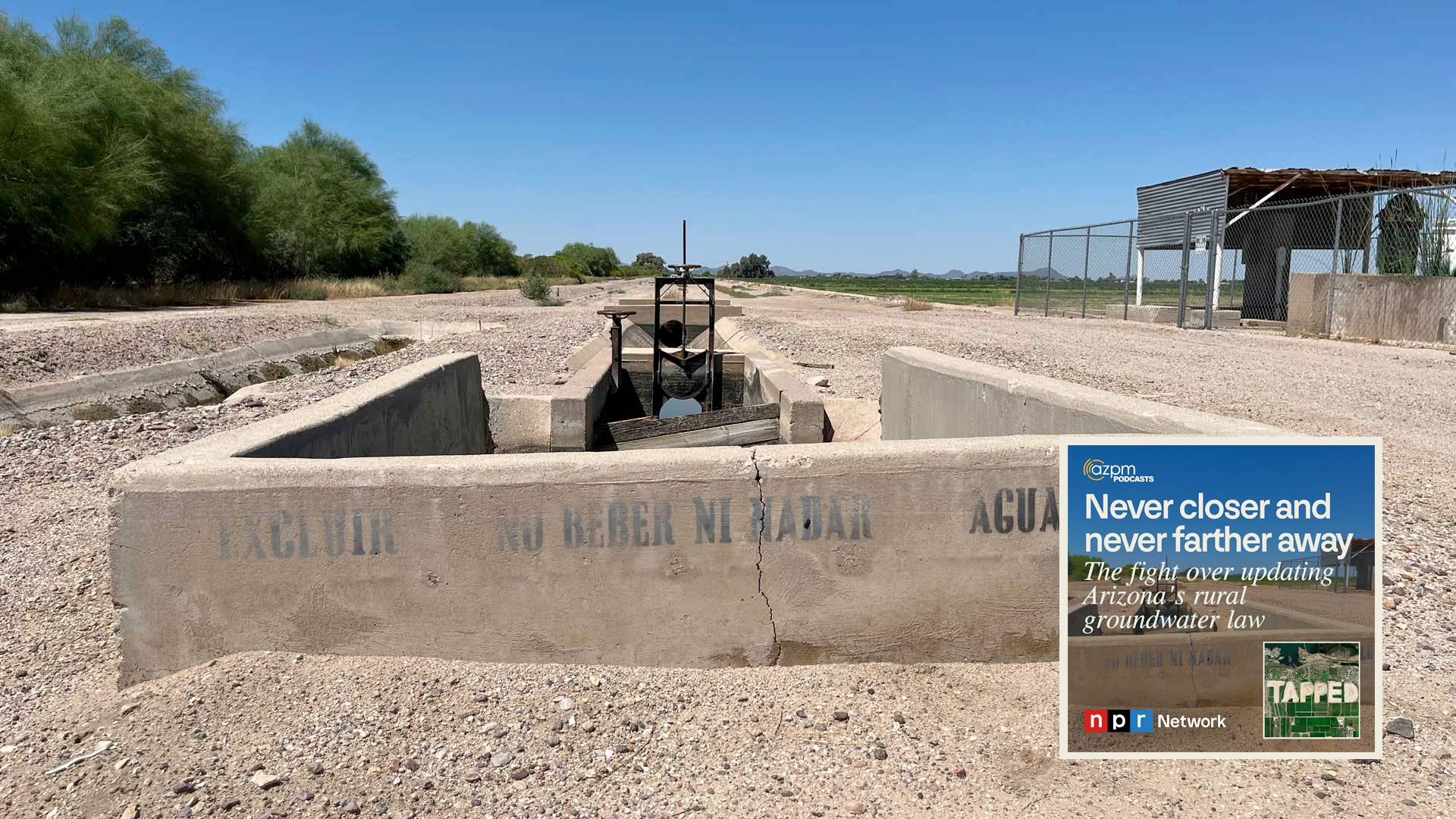 An irrigation ditch using reclaimed water in Marana, AZ. September 2023.
An irrigation ditch using reclaimed water in Marana, AZ. September 2023.
Tapped: Season 3 Episode 08

Arizona has no regulations on pumping groundwater in rural areas. The state's governor is trying to modernize its water laws, and the fight over rural groundwater is in the middle of it. So how did the re-introduction of a water policy council that aimed to solve the problem lead to a pair of bills and division amongst its original members?
Zac Ziegler: Seven days into her first term as Governor of Arizona, Katie Hobbs set out to modernize a law that has governed the water under our feet for over forty years…
She did that by forming the Governor's Water Policy Council, which she announced in her 2023 state of the state speech.
KH:Next, my administration will issue an executive order to launch the Governor's Water Policy Council to modernize and expand the Arizona Groundwater Management Act. Facing our current reality, it’s time to update groundwater management tools and protect groundwater supplies, particularly in our rural communities.
Hannah Cree: The main task of the council…expanding and modernizing the Arizona Groundwater Management Act of 1980, is a very tall order. That piece of legislation…which we've talked briefly about in a few other episodes this season… was one of the first of its kind in water policy across the West, because it attempted to guarantee long-term access to water as the state grew.
But one focus of the council quickly turned to what the Arizona Groundwater Management Act didn’t do…
KH: We must take these actions today because in our state there are effectively no restrictions on groundwater pumping and local communities have little-to-no support to manage water supplies. As a result, a new water user can move in, dig a well, and pump as much water as possible – even if it dries up the community’s aquifer. This is why you see a Saudi Arabian conglomerate pumping local groundwater nearly unchecked in La Paz County today, to grow water-intensive crops and send them to the other side of the planet.
ZZ: Let's set aside the conversation about water use in Arizona’s sprawling metro areas, and shift our attention to the people and communities outside of them… because as the Governor said, there are virtually no restrictions on rural groundwater pumping, and the reality is wells are running dry.
(music fades in)
This is Tapped, a podcast about water, I'm Zac Ziegler.
HC: And I'm Hannah Cree. AZPM talked to five members of the Governor’s water policy council, including two members that ultimately decided to walk away from the table, to unpack the ongoing negotiations.
ZZ: So what should we do - or not do - when it comes to Arizona’s rural groundwater?
(Music fades out) Hannah handled all the reporting on this one, so she'll take it from here.
KH: Hello, good afternoon everyone, and welcome, I am so pleased to convene this first meeting of the water policy council.
HC: The first meeting of the governor’s water policy council was in May of 2023…with 40 members representing tribes, industry leaders, farmers, mining and state lawmakers…
But only five months went by before the political fireworks started.
[Clip from ABC 15 News] On Friday…two of agriculture’s biggest voices on the Governor’s Water policy council quit in protest.
HC: Stefanie Smallhouse represented the Arizona Farm Bureau…she, along with Republican Senator Sine (C-nuh) Kerr, a dairy farmer from Buckeye ...resigned in October 2023.
 AZ Senator Sine Kerr
AZ Senator Sine Kerr
Smallhouse says she didn’t feel like the council was willing to listen to the Farm Bureau’s water expertise…
SS: It became very clear pretty early on in the council process that it wasn't really an environment for offering up those types of new ideas and concerns and discussion points, it was more a process of looking what had already been developed and just reviewing it.
HC: It’s worth noting the Farm Bureau is a powerful national lobbyist group…in the past, they’ve been reluctant to acknowledge climate change, but have taken steps to embrace climate science in the last five years.
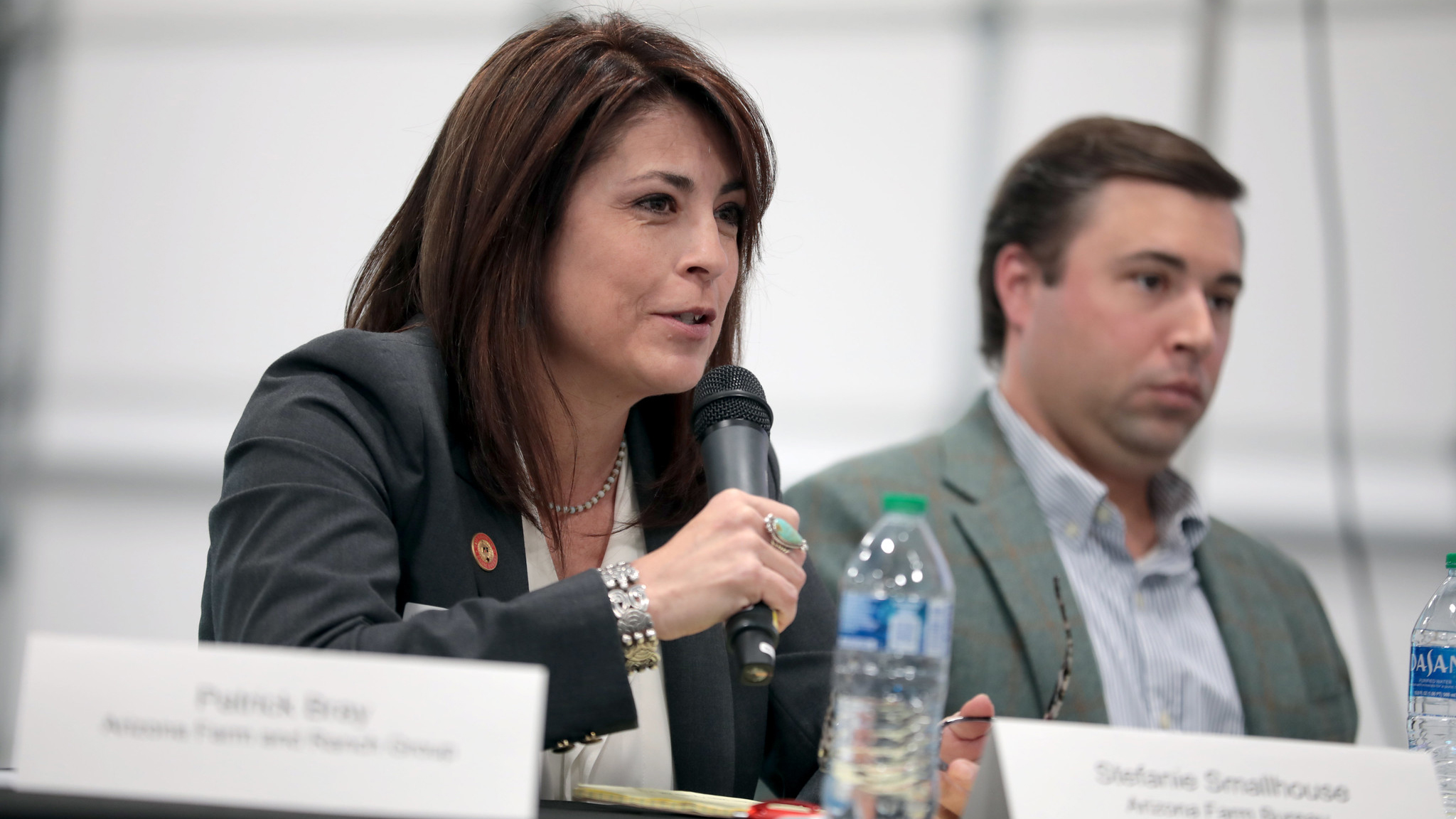 Stefanie Smallhouse of the Arizona Farm Bureau
Stefanie Smallhouse of the Arizona Farm Bureau
Senator Kerr told a reporter after she left that the council was “nothing more than a forum to rubber stamp the progressive environmental goals of special interest groups.”
Now, almost a year later, she still feels agriculture’s ideas were dismissed…
SK: So I was really encouraged at first. I thought, wow, they're really going to listen, they're going to consider alternate ideas. And then after a couple of meetings, it was very clear that they had a predetermined outcome already laid out. They would mention other ideas or proposals, but there, you know, they were not taken seriously.”
HC: The battle lines were drawn between agriculture and nearly all other stakeholders… But Kerr and Smallhouse’s withdrawal was not the end.
Here’s Smallhouse again..
SS: Immediately after stepping off the council, we went to work on our own. So from October of '23 until June essentially of '24, we worked non stop on a new framework that was proposed in this legislative session called SB 1221 which is Basin Management Areas.
HC: The two continued meeting privately with agricultural stakeholders and even across the aisle, they claim, alongside Republican chair of the Natural Resources, Energy and Water Committee Gail Griffin, who remained on the council but expressed support for the rural stakeholders who left.
That Senate Bill, 1221, drafted mostly behind closed doors, got the farthest, and succeeded in making those not included - AKA the rest of the governor’s council - pretty upset.
(music fades in)
However, after some transformation, those on both sides are saying the state’s never been closer to a rural groundwater management agreement.
Let’s start with the basics… and probably something you already know if you’re a Tapped fan.
The lawmakers who wrote the Groundwater Management Act of 1980 designed two tools that are still the backbone of water management today…the first, Active Management Areas, or AMA’s, mostly surround Arizona’s most populous areas and have certain restrictions on development and groundwater conservation goals that everyone in the boundaries has to comply with.
The second, Irrigation Non-Expansion Areas, apply more to agricultural areas. When concerns over groundwater reach a certain level in a basin, INA’s are established to essentially cap further irrigation from taking place within a certain boundary.
The provisions of these areas also don’t appropriately address the needs of Rural Arizonans, which is one thing the council could agree on. Tucson Senator Priya Sundareshan, who was on the council, explains the goal.
PS: There's only two tools available under current law. We're trying to make a third tool for rural areas, and we were trying to make it so that it's not more difficult to implement this third approach.
(music fades out)
 AZ House Rep. Priya Sundareshan
AZ House Rep. Priya Sundareshan
HC: The Senate side called their new tool Basin Management Areas. But before any concessions were made on Ag’s side, the Senate bill was, in Republican fashion, cautious about regulation and centralized power.
Mohave County Supervisor Travis Lingenfelter, a Republican in favor of regulation, was an alternate on the council and became an outspoken critic of the Senate Bill…
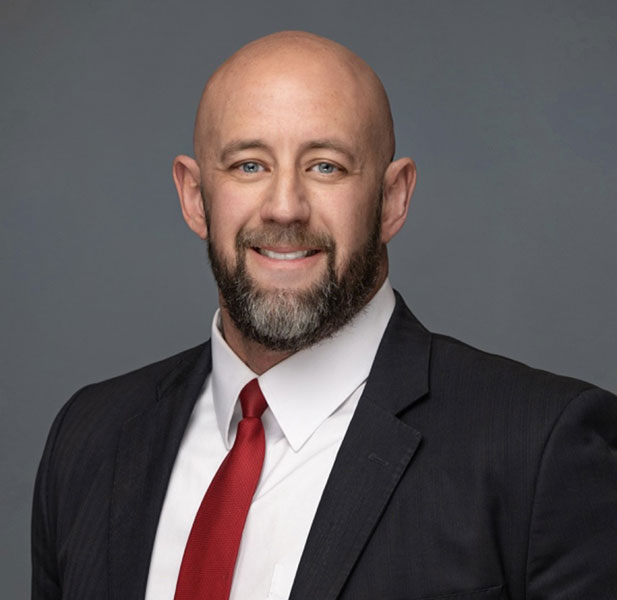 VIEW LARGER Mohave County District 1 Supervisor Travis Lingenfelter.
VIEW LARGER Mohave County District 1 Supervisor Travis Lingenfelter.
TL: To commoditize water with those certificated water rights. It's really contrary to conservation.
HC: He’s talking about a provision in the original Senate Bill that would give water users certificates guaranteeing water rights certificate guaranteeing water rights…it basically means users who pumped before a BMA was established are guaranteed the same amount of water…He says the council did not want it to work that way…
TL: We wanted to give acknowledgements to everybody that was using water currently, and then bring all those people around the table to decide upon conservation goals and make sure no one group had to take the majority of that. I mean, it should be ag and industry and municipal. We all agreed about that, but to give water rights that you actually can bank and then sell or lease is contrary to conservation.
HC: The establishment of any management area, whether it be AMA, INA, or BMA, is a long, bureaucratic process…and kind of similar to establishing a new, weird, city.
(music fades in)
First you have to negotiate the boundaries; who’s going to be included in this management area?...Is everyone living in those areas on board? then, you have to decide who’s going to be in charge of that area…usually, a water council. But who’s going to be eligible for the council? Will they be appointed or will they be elected? Then there’s the question of what the council will actually do. This is usually called the management plan, which is supposed to execute the council’s management goals.
Whew! That’s a lot! All of these questions present endless opportunities for political differences to bring things to a halt, not to mention the fact that the whole process usually takes years. The newest AMA around Douglas was approved by voters in 2022, and just this month put out a first draft of their management plan.
Lingenfelter said the Senate Bill’s election guidelines for members of the water council worried him, particularly that it would turn into a “popularity contest” among Big Agriculture representatives with money to spend on expensive campaigns.
TL: Initially when the bill was dropped, they had this election component where this new groundwater committee would be elected, and there was no guarantee that all of those folks wouldn't be representatives of international or California or other types of large scale corporate agriculture. There wasn't any mention of having a hydrologist or any sort of water modeling.
(music fades out)
HC: Another area of tension on the Senate Bill’s side was the management plan and its execution…
In its first few drafts, SB1221-the bill that those who left the council put together- prioritized economic interests and limiting the powers of any possible management strategy. It did not include any mandatory cuts to water use like the council wanted, or even concrete conservation goals. It mainly outlined what the Department or governing body was not allowed to do, says Lingenfelter, which included placing limits on how much a user could conserve…
TL: You could not have in your plan that you would conserve more than 10% and I think it went up to 15% during the first I think it's 10 years. But what if a basin could conserve 17% or 20%? Why would we prevent that?
HC: Mainly, the Senate bill said any cuts to water users had to be the same percentage across all users…so small personal wells would be required to cut their use as much as a hundred acre farm. Since both those stakeholders would have to agree on a percentage to be cut, logically the smallest possible cut would move forward in order to protect small water users from unreasonable expectations… while huge water users would face very little pressure from regulation.
But they couldn’t quite do it, as Kerr explains.
SK: We had absences in the House. And so we, we knew we didn't have the votes to get it over to the governor's desk, but we wanted to show and what the stakeholders needed to see was that their work was not in vain, and it was successful in that we got every single Republican to vote for the bill in the House, and but we just didn't have the 31 that we needed.
HC: However, the bill that made it to the House floor had significant concessions on Agriculture’s side. The language about equal percentage cuts across all users stayed in…but they also agreed to a 10 percent mandatory cut to water use across all users within 10 years, plus an additional 5% after that. And that was hard won, says Smallhouse.
SS: 10 to 15% water cut for a farmer is huge. It would require a significant investment in greater conservation technology, and people have to understand that many of the farmers that are in these basins already have the highest technology in place, and so cutting 10 to 15% you're literally taking farmland out of production.
HC: Quick note here that the 10% cut would take place gradually over ten years… the bill prohibits more than a 2 percent cut per year…
Ag stakeholders also agreed to a governor-appointed council, a concession from water council elections.
The fireworks weren’t over, though. At the last meeting of the Council just three days after that bill died, several Democratic lawmakers expressed serious anger at the last minute attempt to pass it…Here’s Tempe representative Stacey Travers at that meeting, talking about how the Senate bill, in her opinion, did not represent the interests of the council…and was pre-written, which was exactly what Republicans/Ag complained about before leaving…
And here’s your warning for some strong language coming up…
ST: Quite honestly I’m a little frustrated and a little angry because I feel like while I’m incredibly honored to be part of this council, I'm not really sure what the point to being here was. Because nothing that we had to say ultimately was heard. 1221 was written prior to coming to the table and having these negotiations. We were here and now we’re sitting here six months later and we’re having another presentation not about really what we talked about, but what you all talked about in closed door meetings. And so this is what, a little get-together to tell us what you guys have done and that we should be on board with it? Quite honestly I think it’s kind of bullshit.
ZZ: After the break, Hannah takes us to the other side of this fight.
[break]
ZZ: This is Tapped a podcast about water, I'm Zac Ziegler. Before the break, we heard about an attempt to pass a bill that many on Arizona's Water Council saw as well short of what's needed. Now, Hannah Cree takes us to the other side of the debate and its attempt to pass meaningful water legislation.
HC: Let’s shift our focus to the other side of the table, those in favor of stricter groundwater regulation who yes, tend to be Democrats, but also include Republicans like Lingenfelter from rural areas, and farmers like Ed Curry, a Willcox Chile Farmer on the council who peppered the meetings with blue collar quips like this…
EC: Gail, my hat’s off to you, and your group, on makin’ lots of concessions and eating some crow, and trying to get here. At the same time, I feel we have to give a little more than Gail feels we have to give.
HC: Curry said he was approached by the Republican and Ag side for their bill. But many members of the council said that an opposing House Bill, introduced by Sundareshan and Chris Mathis, another Democrat, better reflected the nine months of meetings.
(music fades in)
The House Bill would have given the Director of ADWR more power, including the ability to fast track the management area establishment process if they notice certain groundwater concerns like land subsidence.
Regulation backers originally wrote in a mandatory 20 percent cut over a decade, but they eventually went back to 10 percent.
Instead of laying out what the management council was not allowed to do, the House Bill also gave the management area council much more structured guidelines and incentives for all types of water users to use less… think recommendations for water quality monitoring programs, or programs that benefit users who try to use recycled water
It also tried to crack down on something that you heard about last episode, hedge funds buying up Arizona land so they can potentially sell the water rights to other parts of the state. Lingenfelter explains.
TL: We were sort of against creating some sort of a similar market with rural groundwater, because a lot of these rural communities, there is no plan B for a water source.
HC: The House Bill says the sale of groundwater certificates is allowed, but that each transfer of water rights to a different owner would decrease that certificate’s allowance by 15%.
The pro-regulation House Bill needed to go through the Joint Natural Resources, Energy and Water Committee, which is chaired by Gail Griffin from Cochise County - remember, she expressed support for the Ag stakeholders that walked away from the table.
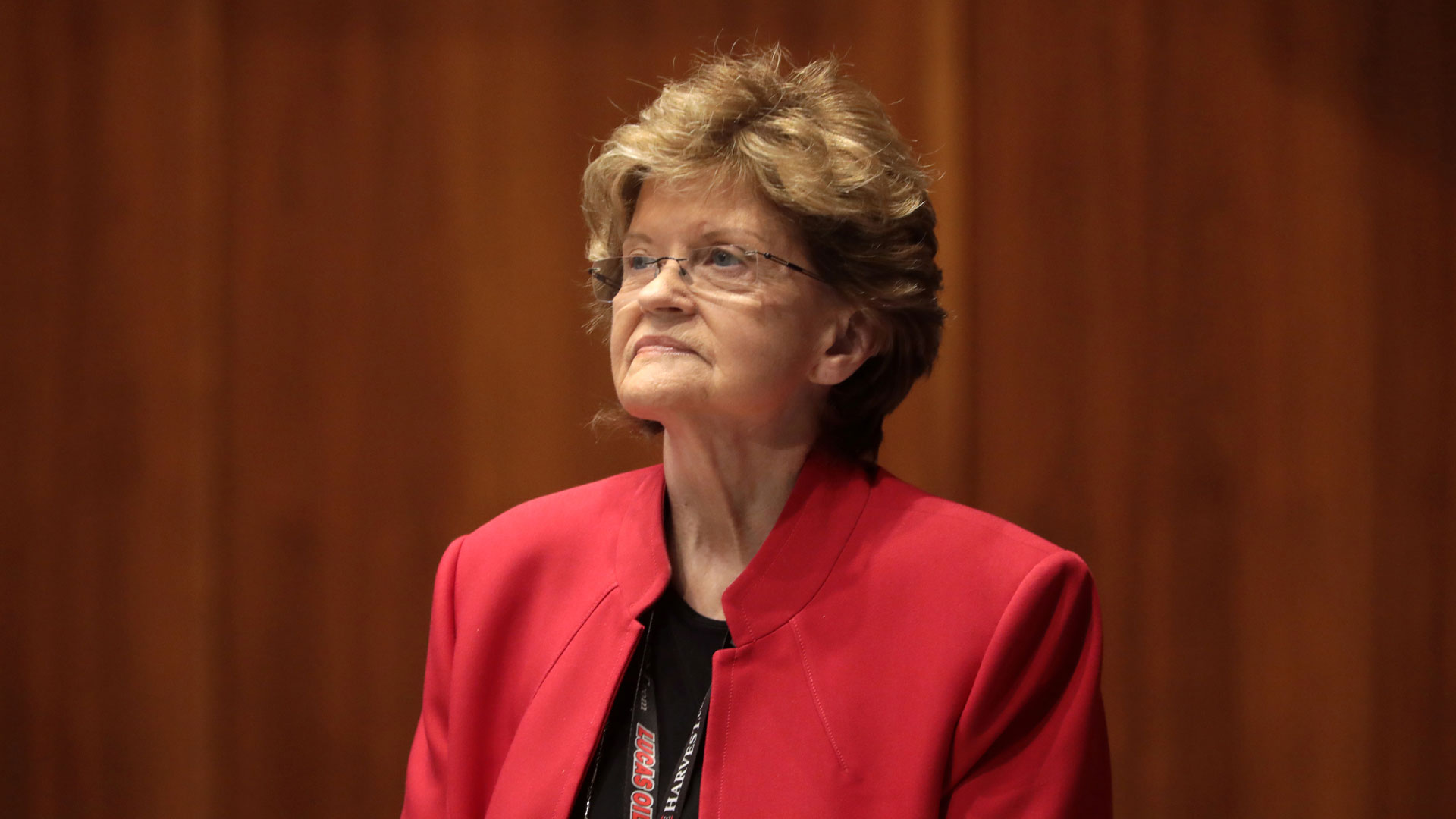 AZ House Rep. Gail Griffin
AZ House Rep. Gail Griffin
Lingenfelter says she never assigned the House bill a hearing, and the bill died in committee,
TL: Those that couldn't control the conversation like they've always controlled the conversation, they labeled it partisan and didn't get a hearing.
HC: The death of the Senate bill meant no legislation was passed from the first year of the governor’s water policy council.
But negotiations have continued…and that 10 percent agreement on both sides is probably the biggest success to come out of the council… -it’s pretty safe to say any future legislation is going to include similar guidelines, although Sundareshan says many on her side want to see that go further in the future…
PS: If it was me by myself introducing a bill I might be leaning much more into, you know, a stronger evidence and data based management solution, and one that has really strong enforcement capabilities, really protective of what currently remains in our aquifers, because groundwater does not get replenished.
(music fades out)
HC: The biggest sticking point involves calculating a user’s 10 year water average… that number is important because it will determine how much water a user was allowed to start with, and what they have to reduce to at the end of a 10 year management period…
The disagreement, Smallhouse explains, is over whether to include a farmer’s “zero years,” or years they didn’t farm, or use water.
SS: There's a lot of reasons why a farmer would not use water in those years. So to count those zero years, significantly drops the average of the amount of water that would then go into their certificate to grow what they normally grow.
The other side worries some users, anticipating future cuts to water, have been pumping more water than they need in the last few years, in hopes of starting off with a higher average if they become part of a management area.
The Farm Bureau says there is hope, but negotiations have a ways to go…
SS: You know, we've never been closer and we've never been farther away. So I believe that the Basin Management Areas, SB 1221, is ready to go. If the zero water use years and the greater conservation cuts continue to be a sticking point, then we are very far apart, because I just don't see us coming any closer on those two items, because we've already given more than what we're comfortable with in terms of negotiations.
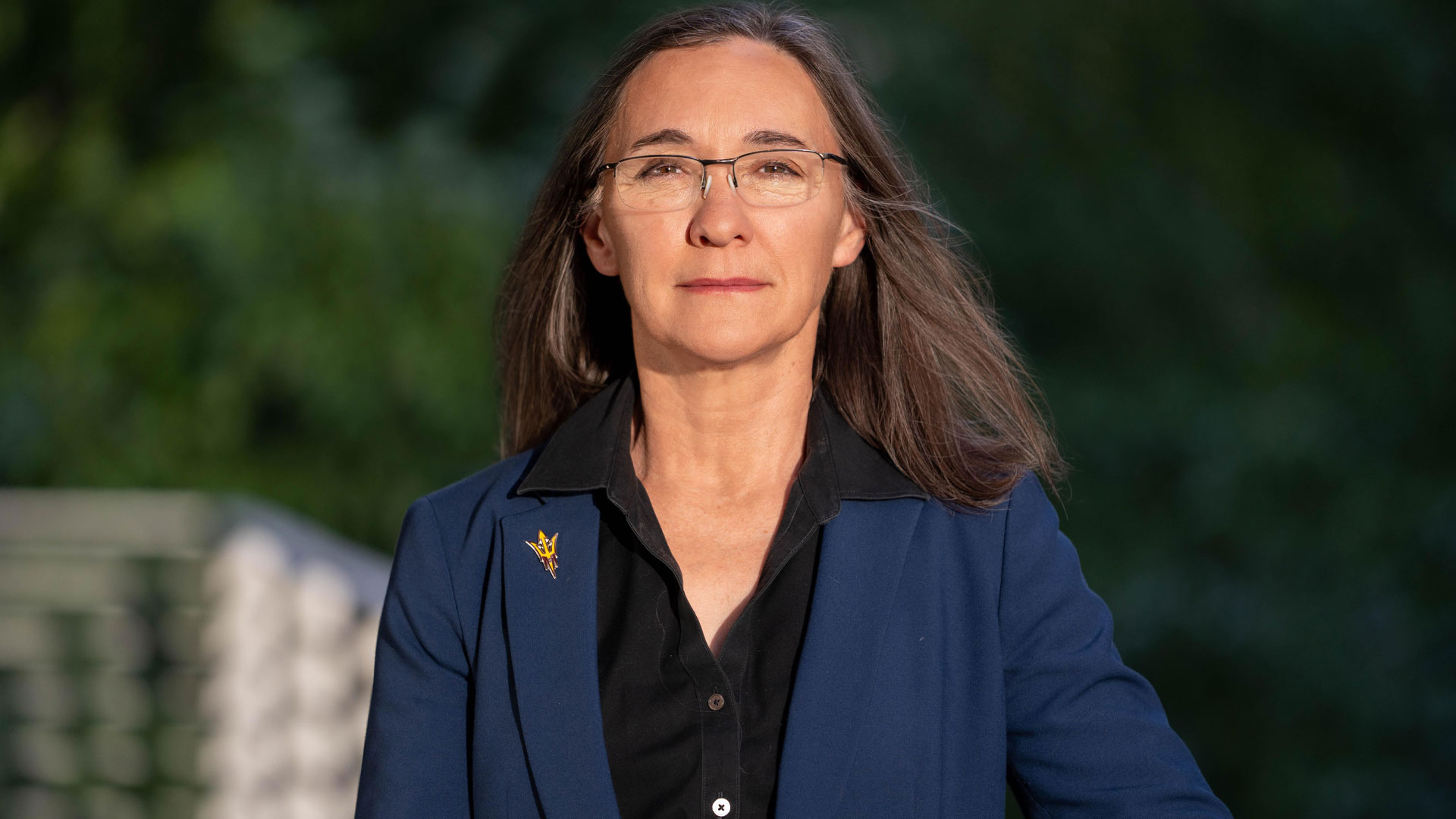 Sarah Porter, director of the Kyl Center for Water Policy
Sarah Porter, director of the Kyl Center for Water Policy
HC: Sarah Porter, a water law expert with Arizona State University’s Kyl Institute for Water Policy, also sat on the council. As she reflected on the outcome, she says the conversation about regulation gets twisted…
SP: Every time Arizona has done any kind of groundwater management, it protects the existing ag users, but in the conversations it isn't presented as a protection. Instead, for some reason, the conversation is that it's about taking away the ability of landowners to use groundwater, you know, with the measure of freedom that they have now.
HC: But she understands how the conversation about potential regulations gets so intense.
SP: It is very hard. It goes back to like it is very hard to to have a conversation that fundamentally is going to limit people's ability to use their land, and it does become a political conversation. Especially, many people in Arizona believe, even though it's incorrect, that the water under their land is their property. That's never been the law in Arizona, and we have an Arizona Supreme Court opinion that says it is not your property. The fact that there's moisture in the earth beneath your land doesn't mean that it's your moisture. But regardless of what our Supreme Court said at some point, it feels to people, to some people, that we're tinkering with a property right. You know, that's a very sensitive area,”
HC: Although there were rumors earlier this summer that the Governor might call a special session to get something passed, that’s now very unlikely as the election approaches. The future of rural groundwater rests now on the next legislative session, as the mounting pressure to do something builds.
ZZ: Political squabbles are nothing new on the state level. Arizona has been deadlocked on water issues for years at this point.
But, in another mostly rural county, a big issue is the occasional presence of too much water. And dealing with that problem gets complicated by the fact that the water issue comes from another country and a much larger city. But, unlike what we heard about in this episode, they're making progress.
That's next time.
Tapped is a production of AZPM News.
This episode was written and reported by Hannah Cree with audio production by me, Zac Ziegler.
Our editor is our news director, Christopher Conover.
Our theme music and some interstitial music is by Michael Greenwald.
Go to our website in the podcast section of azpm.org for pictures, links and more.
Thanks for listening.
(music fades out)
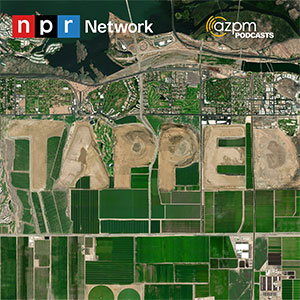





By submitting your comments, you hereby give AZPM the right to post your comments and potentially use them in any other form of media operated by this institution.